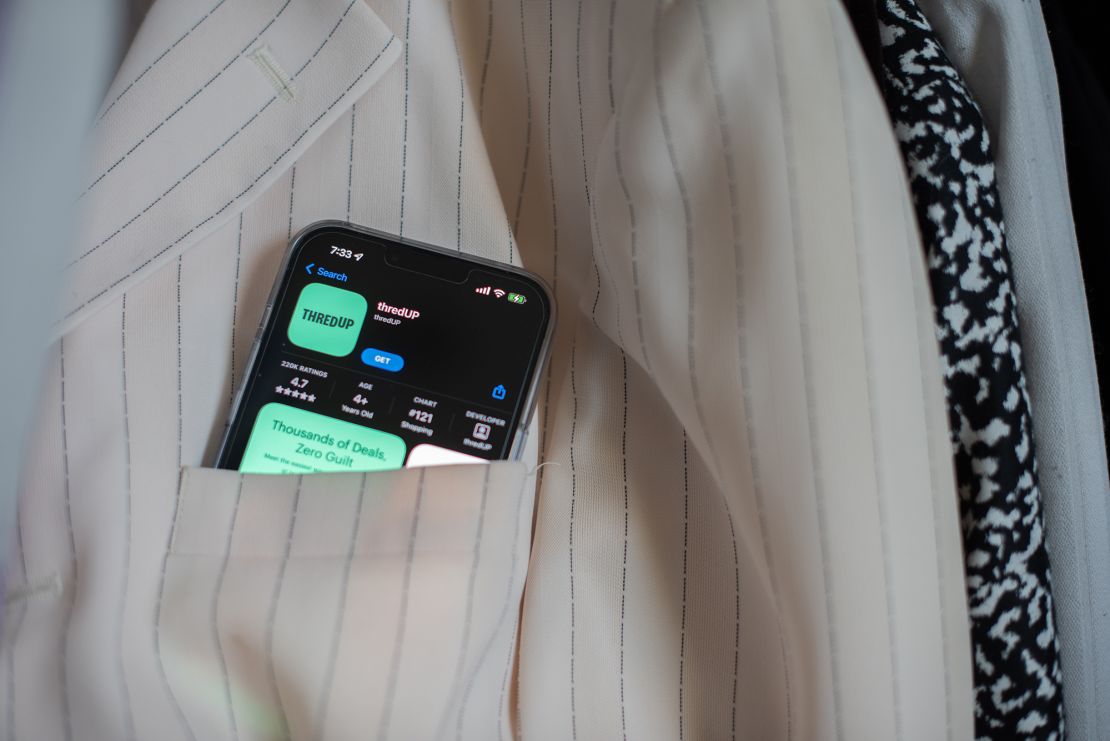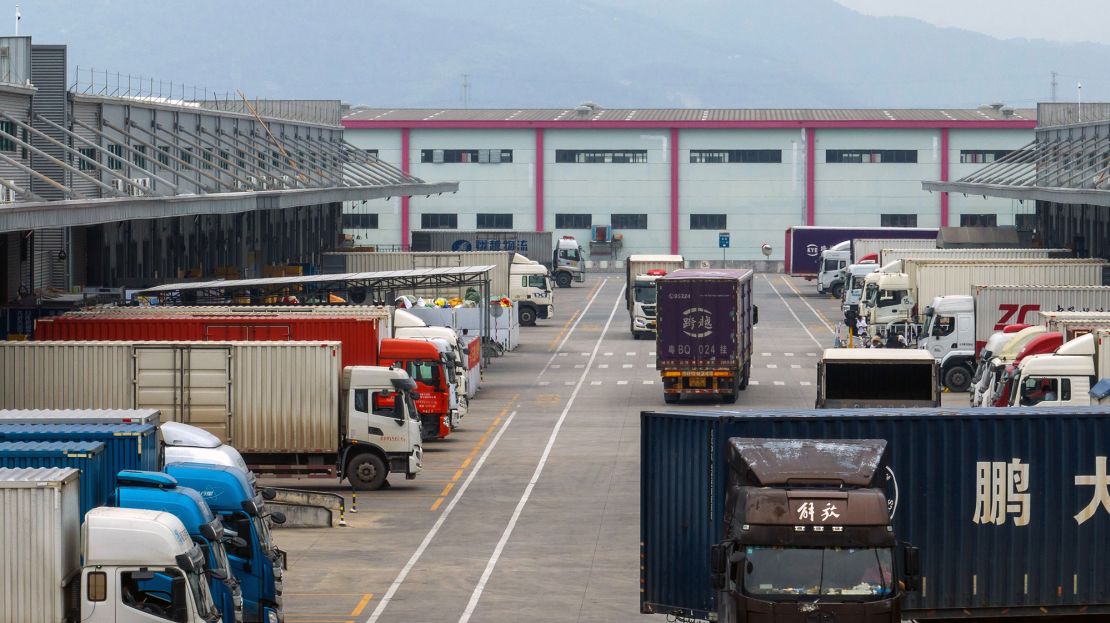New York
CNN
—
Retailers are freaking out over tariffs.
President Donald Trump’s tariffs, if enacted after the 90-day suspension, will impact some of the biggest textiles exporters, including Bangladesh, Vietnam and Pakistan. The United States Fashion Industry Association — a trade organization representing the interests of importers, wholesalers and major retailers from Urban Outfitters to Walmart — said its industry “depends on global supply chains more than perhaps any other sector of manufactured goods.”
And the tariffs have come directly for fast fashion, which has become a major segment of the American clothing market in the past decade. Shein and Temu make up 17% of the discount US market, according to a congressional report on China’s e-commerce exports. The “de minimis exemption,” which allows packages worth less than $800 to enter tax-free into the United States, will be canceled for shipments from China starting May 2. The Trump administration has now implemented a tariff of 120% on those goods (or a “per postal item” cost of $100 starting May 2, which goes up to $200 on June 1).
One retailer is celebrating, however.
In a statement last week, online consignment and thrift store ThredUp said it “applauds” the closure of the de minimis exemption for China, saying it “provided an unfair advantage to fast fashion retailers.”
“We believe that making fast fashion more expensive will incentivize consumers to choose… secondhand options” instead, said the company, which reported $322 million in annual revenue and 1.8 million active buyers in 2023.

Chinese e-commerce sites such as Shein, Temu and Aliexpress have built their gargantuan business models around de minimis shipments. The relaxed restrictions and tax exemptions on cheap products allowed more than 1 billion packages to pour in at a low-cost price in 2023 for consumers looking for a deal on everything from clothing to household goods, the congressional research report said.
Getting rid of de minimis could have major impacts on how Americans shop; 80% of total US e-commerce shipments in 2022 were de minimis imports, the vast majority of which come from China, according to the congressional research report.
Can tariffs change a mindset?
Fast fashion has taken over the retail industry. In this business model, the latest trends are quickly churned out at low prices, despite the environmental waste and often questionable labor practices.
Fast fashion has gotten even faster thanks to retailers like Shein, Temu and Aliexpress. On these apps, customers are met with an algorithm of endless scrolling through inexpensive goods that can make it from warehouses in China to their doorsteps in a matter of a few days.
Consignment and thrift store retailers like ThredUp promote the antithesis, which they call “slow fashion,” as they say the best way to get inexpensive items in the most sustainable and ethical manner is to simply buy secondhand.
“Our supply chain, if you will, comes from the closets of American customers,” ThredUp Chief Strategy Officer Alon Rotem told CNN. He said the company had been lobbying Congress to eliminate the de minimis exemption for years, and he hopes to see a bill passed instead of relying on an executive order.
For the first time, he said, slow fashion could have a chance at leveling the playing field against the behemoth that is fast fashion. In a March survey conducted with ThredUp and GlobalData of more than 3,000 people, nearly 60% said that if tariffs made clothes more expensive, they’d explore alternatives like the secondhand market. Some younger consumers already started doing that, even before the tariffs — almost 40% of Millennial and Gen Z shoppers had made a secondhand purchase online in the last year, the survey found.
But young people are also driving fast fashion, and that’s because they also want more bang for their buck.
“The number one overlap that we see with resale and with fast fashion is the concept of value,” Rotem said.
But the tariffs might not have a life-altering impact on the resale market. Many fast fashion giants, such as H&M, have diversified their production and make clothes in countries like Vietnam and Bangladesh. Trump’s tariffs on those countries have paused for 90 days, and he has indicated his tariff plans are open to negotiation, though the US will now charge an extra 145% on all Chinese goods that arrive in the US. If tariffs remain at 10% worldwide, fast fashion retailers can absorb much of those costs, Poonam Goyal, a Bloomberg senior equity analyst for e-commerce, told CNN.
Fast fashion brands that operate in the US “are going to actually do better under the de minimis exemption, because they now have a playing ground where they are not price disadvantaged by Shein and Temu bringing in rock bottom prices because they can escape the tariff duty,” Goyal said.
It may take a few months to see the full impact of tariffs. Uniqlo’s Japanese parent company said in its earnings Thursday that the immediate impact of the tariffs will be limited because a significant amount of its stock is already in the US. Uniqlo sources its products from Vietnam, Bangladesh, Indonesia and India, along with China.
And for sites like ThredUp, their competition isn’t Shein and Temu, but any full-priced retailer, Goyal said. Customers have no need for an even cheaper alternative to Shein, but instead are looking for deep discounts on items such as Lululemon leggings.
How can de minimis affect fast fashion?
The de minimis provision has been around since the 1930s, but the threshold has increased over the years. It’s meant to ease trade and help out consumers, Clark Packard, a trade policy research fellow at the Cato Institute, a libertarian think tank, previously told CNN. With the exemption, buyers don’t have to fill out tiresome customs paperwork or pay tariffs on small packages.
In September 2024, the Biden administration announced it was cracking down on what it called “abuse of the de minimis exemption.”

Americans are used to seeing Temu and Shein everywhere. China-based advertisers made up 11% of Meta’s revenue in 2024, up from 6% the year prior, according to the company’s financial reports. Bank of America estimated Temu and Shein could account for 2% to 4% of the ad spending on Google and Meta.
Shein, Temu and other major Chinese sellers have already been trying to get ahead of this by opening backdoor factories in countries like Vietnam and Mexico, and Shein began bulk shipping to US warehouses as early as last year, Chris Tang, a professor of global supply chain management at the University of California, Los Angeles, told CNN. But consumers will soon have to contend with either higher prices or longer shipping times, he said.
“Consumers pay the highest price,” Tang said. “(A) $3 or $4 t-shirt is not going to happen any time soon.”


